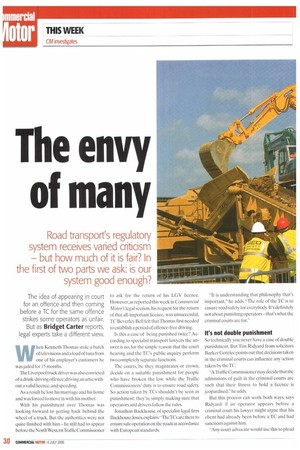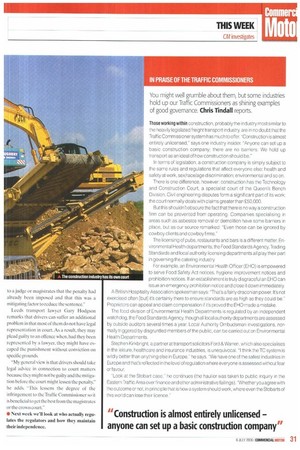The envy of many
Page 30

Page 31

If you've noticed an error in this article please click here to report it so we can fix it.
Road transport's regulatory system receives varied criticism
— but how much of it is fair? In
the first of two parts we ask: is our system good enough?
The idea of appearing in court for an offence and then coming before a TC for the same offence strikes some operators as unfair. But as Bridget Carter reports, legal experts take a different view.
When Kenneth Thomas stole a batch of televisions and a load of tuna from one of his employer's customers he was jailed for 15 months.
The Liverpool truck driver was also convicted of a drink-driving offence; driving an artic without a valid licence; and speeding.
As a result he lost his marriage and his home and was forced to move in with his mother.
With his punishment over Thomas was looking forward to getting hack behind the wheel of a truck. But the authorities were not quite finished with him — he still had to appear before the North Western Traffic Commissioner to ask for the return of his LGV licence. However, as reported this week in Commercial Motor's legal section, his request for the return of that all-important licence, was unsuccessful. TC Beverley Bell felt that Thomas first needed to establish a period of offence-free driving.
Is this a case of being punished twice? According to specialist transport lawyers the answer is no, for the simple reason that the court hearing and the TC's public inquiry perform two completely separate functions.
The courts, be they magistrates or crown, decide on a suitable punishment for people who have broken the law, while the Traffic Commissioners' duty is to ensure road safety. So action taken by TCs shouldn't be seen as punishment; they're simply making sure that operators and drivers follow the rules.
Jonathon Backhouse. of specialist legal firm Backhouse Jones, explains:-TheTCs are there to ensure safe operation on the roads in accordance with European standards. "It is understanding that philosophy that's important:" he adds. "The role of the TC is to ensure road safety for everybody. It's definitely not about punishing operators—that's what the criminal courts are for.
It's not double punishment
So technically you never have a case of double punishment. But Tim Ridyard from solicitors Barker Gotelee points out that decisions taken in the criminal courts can influence any action taken by the TC.
"ATraffic Commissioner may decide that the admissions of guilt in the criminal courts are such that their fitness to hold a licence is jeopardised." he adds.
But this process can work both ways, says Ridyard: if an operator appears before a criminal court his lawyer might argue that his client had already been before a TC and had sanctions against him.
"Any court advocate would use this to plead to a judge or magistrates that the penalty had already been imposed and that this was a mitigating factor to reduce the sentence."
Leeds transport lawyer Gary Hodgson remarks that drivers can suffer an additional problem in that most of them do not have legal representation in court. As a result, they may plead guilty to an offence when, had they been represented by a lawyer, they might have escaped the punishment without conviction on specific grounds.
"My general view is that drivers should take legal advice in connection to court matters because they might not be guilty and the mitigation before the court might lessen the penalty," he adds. This lessens the degree of the infringement to the Traffic Commissioner so it is beneficial to get the best from the magistrates or the crown court."
• Next week we'll look at who actually regulates the regulators and how they maintain their independence.




































































































































































































